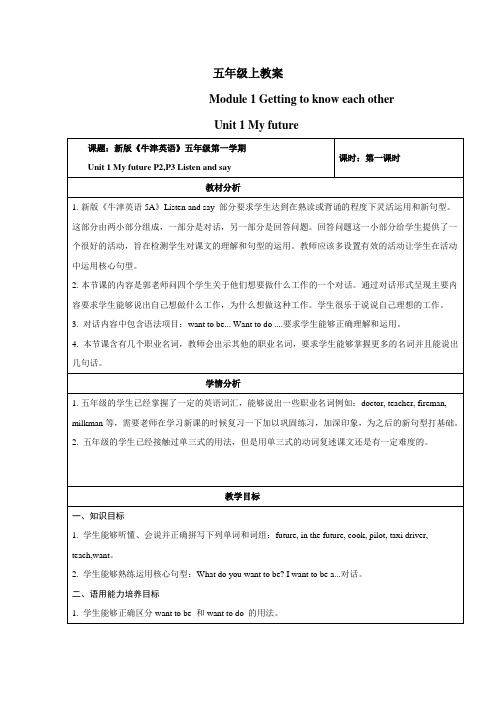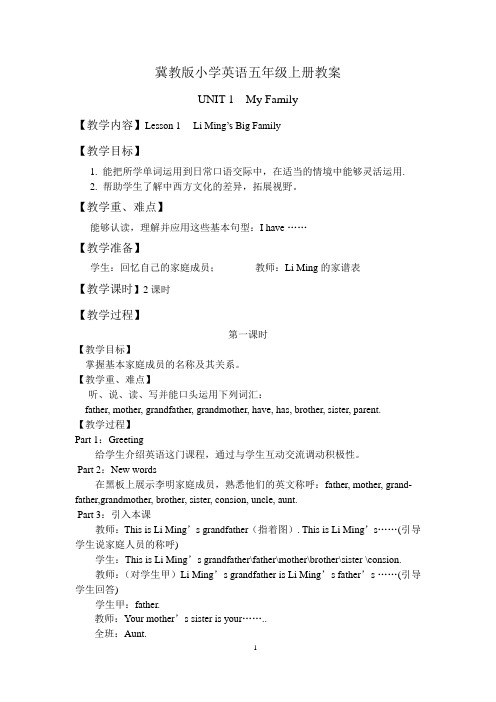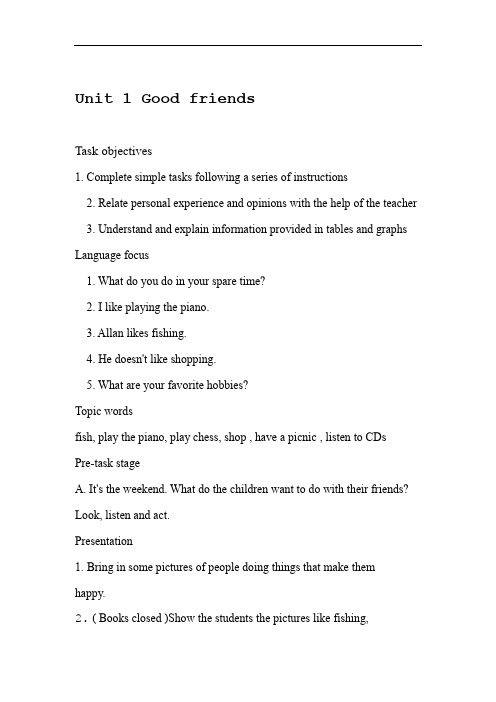深圳小学英语五年级(上册)全教学案
优质课一等奖作品:深圳牛津小学英语五上1Myfuture[李萌]教案
![优质课一等奖作品:深圳牛津小学英语五上1Myfuture[李萌]教案](https://img.taocdn.com/s3/m/b4eda02d581b6bd97f19ea29.png)
教学目标(1)语言技能:通过听、看、表演等活动理解故事内容,训练英语短文的谋篇能力,以目标句型I want to be…书写自己的梦想职业。
(2)知识技能:用一般现在时态来表达职业,熟练掌握单数第三人称的用法以及be 动词的正确运用。
(3)情感态度:乐于分享自己的想法,了解每个人应当要有梦想职业,并明白要去努力实现自己的梦想职业。
(4)学习策略:合作学习,自我探究。
(5)文化意识:职业概念。
2学情分析五年级的孩子有一定的英语基础,注意力更持久,具备一定的表演能力,能胜任更加复杂的学习任务。
3重点难点(1)短文中的关键短语的意思,及其在真实的情境中的准确运用。
(2)对故事中的信息进行提炼、加工和整合。
(3)根据图片、提示等信息构建短文。
4教学过程4.1 第一学时4.1.1教学活动活动1【讲授】Froggy’s New JobStep One : Warm upGet to know each otherStep Two: Lead inShow pictures of cartoon movie 《Frozen》and introduce the main characters : Elsa ,Anna, Olaf . Then answer the question:T: Which character do you like best?S : I like _______________ .Step Three :RevisionWatch a period of 《Frozen》and finish the sentences.Step Four: New learning1. Key words learning:(1) Listen to the recording and learn the new words.(2) Look at the picture and learn the phrases.Then the students act out the sentences.“I’m afraid of flying. Help ! Help ! It’s too high.”(3) Look at the pictures and learn: be (not) good at(4)Watch the flash movie and answer the questions:What does Froggy hear?What’s the matter with the chick ?What does Froggy do ?What can Froggy be? Why?3. Consolidation(1)Read the story(2)Try to retell the story(3)Add a title for the story.(4)Sum up the meaning of the story:I’m who I was born to be .Step Five :IntensionTask 1 Share your dream jobTask 2 Write your dream job_______________My name’s__________. I want to _______________ . ______________________________________________________________________________________ ___________________________________________ ___________________________________________Step Seven:HomeworkRead the story of Froggy.Retell the story of Froggy.Write about your friend’s dream job.。
新深圳牛津小学英语五年级上册教案.doc

Module 1 Getting to know each other
Unit 1 My future
课题:新版《牛津英语》五年级第一学期
Unit 1 My future P2,P3 Listen and say
课时:第一课时
教材分析
1.新版《牛津英语5A》Listen and say部分要求学生达到在熟读或背诵的程度下灵活运用和新句型。这部分由两小部分组成,一部分是对话,另一部分是回答问题。回答问题这一小部分给学生提供了一个很好的活动,旨在检测学生对课文的理解和句型的运用。教师应该多设置有效的活动让学生在活动中运用核心句型。
(2) answer in pairs.
5.Ss: I want to be a doctor.
I want to teach children.
6. The students fill in the blanks.
1.帮助学生学习新单词。
S1: This is Kitty. She wants to be a doctor. She wants to help people.
S2: This is Alice. She wants to be a teacher. She wants to teach English in a school.
S3: This is Joe. He wants to be a cook. He wants to cook nice food.
3.把学生分为若干个小组,让学生在一个小集体中体会到学习的快乐。
四、学习策略目标
1.直观学习策略:本堂课通过直观生动的图象(课文插图),声音(课文音频和视频),再现原文,提高学生兴趣,提高课堂效率。
新深圳牛津小学英语五年级上册教案

五年级上教案Module 1 Getting to know each otherUnit 1 My future课题:新版《牛津英语》五年级第一学期课时:第一课时Unit 1 My future P2,P3 Listen and say教材分析1.新版《牛津英语5A》Listen and say 部分要求学生达到在熟读或背诵的程度下灵活运用和新句型。
这部分由两小部分组成,一部分是对话,另一部分是回答问题。
回答问题这一小部分给学生提供了一个很好的活动,旨在检测学生对课文的理解和句型的运用。
教师应该多设置有效的活动让学生在活动中运用核心句型。
2.本节课的内容是郭老师问四个学生关于他们想要做什么工作的一个对话。
通过对话形式呈现主要内容要求学生能够说出自己想做什么工作,为什么想做这种工作。
学生很乐于说说自己理想的工作。
3. 对话内容中包含语法项目:want to be... Want to do ....要求学生能够正确理解和运用。
4. 本节课含有几个职业名词,教师会出示其他的职业名词,要求学生能够掌握更多的名词并且能说出几句话。
学情分析1.五年级的学生已经掌握了一定的英语词汇,能够说出一些职业名词例如:doctor, teacher, fireman, milkman等,需要老师在学习新课的时候复习一下加以巩固练习,加深印象,为之后的新句型打基础。
2. 五年级的学生已经接触过单三式的用法,但是用单三式的动词复述课文还是有一定难度的。
教学目标一、知识目标1. 学生能够听懂、会说并正确拼写下列单词和词组:future, in the future, cook, pilot, taxi driver, teach,want。
2. 学生能够熟练运用核心句型:What do you want to be? I want to be a...对话。
二、语用能力培养目标1. 学生能够正确区分want to be 和want to do 的用法。
深港版小学英语五年级上册教案5篇

深港版小学英语五年级上册教案5篇深港版小学英语五年级上册教案5篇海阔凭你跃,天高任你飞。
愿你信心满满,尽展聪明才智;妙笔生花,谱下锦绣第几篇。
学习的敌人是自己的知足,要使自己学一点东西,必需从不自满开始。
以下是带来的深港版小学英语五年级上册教案内容,感谢您的阅读,希望能帮助到您!深港版小学英语五年级上册教案1《Im in New York now》Teaching objectives:1. Words: arrive taxi flat building made again2. Sentences:Grandma made Chinese food for me.I want to try American food.I will write again soon.3. Practise to pronounce ‘wh’‘wr’.4. Learn the song: It’s a big exciting world.Teaching properties: cards tape-recorder picturesTeaching proceduresWarmer:1. Stick the pictures of unit 1 on the board. Have the students come to thefront and mime the text of unit 1.2. Say a sentence in the present tense and get thestudents say it in thepast tense.Examples:T: Daming goes to New York.Ss: Daming went to New York.T: Grandma meets Daming.Ss: Gradma met Daming.Teach the text:1. Raise the picture of the Statue of Liberty and ask: What is it ? Whereis it?”Guide the students say: It’s the statue of Liberty. It’s in New Yo rk”.T: Daming is in New York now. Let’s see who met him at the airport. What hesaw in New York and What food he wanted to eat.2. Play the tape. Have the students listen and underline the new words inbooks.3. Teach the new words.4. Play the tape again. Have the students listen and say. After this, getthe students to answer the following questions:⑴Who met Daming at the airport? (Grandma and Simon)⑵What did Daming see in New York? (Buildings, cards and people)⑶What food did he want to try? (American food)5. Complete activity 2 in SB. (Get the students to ask and answer inpairs)6. Practise to pronounce wh wr.7. Learn the song: It’s a big exciting world.8. Complete exercise 1 in AB.Homework:Practise the following sentences in pairs:Where are you from?Where are you going to go?Where are you going to go there?Where are you going to do there?Designs:Module 10 Unit 2 I’m in New York nowArrive Grandma mad Chinese food for me.TaxiFlat I want to try American food.buildingmade I will write again soon深港版小学英语五年级上册教案2一、学生情况分析学生已学过两年多的英语,已有一定的基础,并且教材难度偏大,教学内容与课时不成比例,学生的学习兴趣难以保持,两极分化较严重。
新深圳牛津小学英语五年级上册教案

新深圳牛津小学英语五年级上册教案

五年级英语上全册教案Module 1 Getting to know each otherUnit 1 My future课题:新版《牛津英语》五年级第一学期课时:第一课时Unit 1 My future P2,P3 Listen and say教材分析1.新版《牛津英语5A》Listen and say 部分要求学生达到在熟读或背诵的程度下灵活运用和新句型。
这部分由两小部分组成,一部分是对话,另一部分是回答问题。
回答问题这一小部分给学生提供了一个很好的活动,旨在检测学生对课文的理解和句型的运用。
教师应该多设置有效的活动让学生在活动中运用核心句型。
2.本节课的内容是郭老师问四个学生关于他们想要做什么工作的一个对话。
通过对话形式呈现主要内容要求学生能够说出自己想做什么工作,为什么想做这种工作。
学生很乐于说说自己理想的工作。
3. 对话内容中包含语法项目:want to be... Want to do ....要求学生能够正确理解和运用。
4. 本节课含有几个职业名词,教师会出示其他的职业名词,要求学生能够掌握更多的名词并且能说出几句话。
学情分析1.五年级的学生已经掌握了一定的英语词汇,能够说出一些职业名词例如:doctor, teacher, fireman, milkman等,需要老师在学习新课的时候复习一下加以巩固练习,加深印象,为之后的新句型打基础。
2. 五年级的学生已经接触过单三式的用法,但是用单三式的动词复述课文还是有一定难度的。
教学目标一、知识目标1. 学生能够听懂、会说并正确拼写下列单词和词组:future, in the future, cook, pilot, taxi driver, teach,want。
2. 学生能够熟练运用核心句型:What do you want to be? I want to be a...对话。
二、语用能力培养目标1. 学生能够正确区分want to be 和want to do 的用法。
【深圳市】冀教版小学英语五年级上册教案

冀教版小学英语五年级上册教案UNIT 1 My Family【教学内容】Lesson 1 Li Ming’s Big Family【教学目标】1. 能把所学单词运用到日常口语交际中,在适当的情境中能够灵活运用.2. 帮助学生了解中西方文化的差异,拓展视野。
【教学重、难点】能够认读,理解并应用这些基本句型:I have ……【教学准备】学生:回忆自己的家庭成员;教师:Li Ming的家谱表【教学课时】2课时【教学过程】第一课时【教学目标】掌握基本家庭成员的名称及其关系。
【教学重、难点】听、说、读、写并能口头运用下列词汇:father, mother, grandfather, grandmother, have, has, brother, sister, parent.【教学过程】Part 1:Greeting给学生介绍英语这门课程,通过与学生互动交流调动积极性。
Part 2:New words在黑板上展示李明家庭成员,熟悉他们的英文称呼:father, mother, grand- father,grandmother, brother, sister, consion, uncle, aunt.Part 3:引入本课教师:This is Li Ming’s grandfather(指着图). This is Li Ming’s……(引导学生说家庭人员的称呼)学生:This is Li Ming’s grandfather\father\mother\brother\sister \consion.教师:(对学生甲)Li Ming’s grandfather is Li Ming’s father’s ……(引导学生回答)学生甲:father.教师:Your mother’s sister is your……..全班:Aunt.教师:(继续问题)Your …….. is your ……….Part 4:阅读短文,复习家庭成员名称。
深圳小学英语五年级上册全教案

Unit1 Good friends重点单词fish鱼,钓鱼lake湖chess象棋piano钢琴palace宫殿picnic野餐listen听hobby爱好worth值得collect收集boring乏味的understand理解expensive昂贵的country国家animal动物popular流行的interesting有趣的foreign外国的pound英镑England英国spare业余的learn学习mistake错误Chinese中国人,汉语重要词组play chess下象棋play the piano弹钢琴listen to CDs听CD listen to music听音乐have a picnic野炊play sports运动come over过来after school放学be good at 擅长like drawing喜欢画画Children’s Palace少年宫go fishing去钓鱼like playing basketbal喜欢打篮球on my computer在我的电脑上in your spare time在你的业余时间at my friend’s home在朋友的家里句型:-What are you going to do? -I'm going to have a picnic.你打算干什么?我打算去野炊。
-What do you do in your spare time? -I like playing the piano and fishing.你闲暇时做什么?我喜欢弹钢琴和钓鱼。
I have lots of hobbies.我有很多爱好。
I don't like drawing or painting. I'm not good at those things.我不喜欢素描也不喜欢油画.我不擅长那些事情。
I don't like shopping but my sister does.我不喜欢逛街,但是我姐姐喜欢。
新深圳牛津小学英语五年级上册教案.doc

Q1: My father is a doctor.
Q2: I can wash my clothes.
Q3: I like helping my mother to wash the dishes.
帮助学生复习关于职业的名词并且为本课的学习做铺垫。
While-task procedure
学情分析
1.五年级的学生已经掌握了一定的英语词汇,能够说出一些职业名词例如:doctor, teacher, fireman, milkman等,需要老师在学习新课的时候复习一下加以巩固练习,加深印象,为之后的新句型打基础。
2.五年级的学生已经接触过单三式的用法,但是用单三式的动词复述课文还是有一定难度的。
3.把学生分为若干个小组,让学生在一个小集体中体会到学习的快乐。
四、学习策略目标
1.直观学习策略:本堂课通过直观生动的图象(课文插图),声音(课文音频和视频),再现原文,提高学生兴趣,提高课堂效率。
2.活动学习策略:让学生以小组为单位讨论自己未来的职业。
3.合作学习策略:学生以小组为单位复述课文,学会用第三人称的口吻介绍他人未来的职业,提高合作学习的积极性,培养集体荣誉感。
3)Let the students introduce other students’ composition.
1. Retell the text in groups
2.
1)Ss introduce themselves .
2)Ss: Look at the paper and write
3)Introduce other students’ composition.
6)What do teachers do? (They teach students.)
新深圳牛津小学英语五年级上册优秀教案

五年级上教案Module 1 Getting to know each other Unit 1 My futureUnit 1 My future 第二课时一、Pre-task preparations1. 学生或教师准备一些亲人或朋友的图片,向班级展示并进行描述。
S1: This is my uncle. He can cook well. Helikes cooking. He works in a restaurant.He is a cook.S2: This is my mother. She likes Chinese. She works in a school.She is a Chinese teacher.(2)使用本单元的核心句型及词汇引领学生朗诵儿歌。
教师出示不同工作的照片或词卡,引导学生把单词套入歌谣中。
What do you, what do you, what do you want to be?I want to, I want to, I want to be a /an ...What do you, what do you, what do you want to be?I want to, I want to, I want to be a /an ...二、While-task procedures1. 听Listen and say 的录音,学生回答问题。
1)What does Peter want to be? (He wants to be a pilot.)2)What do pilots do? They fly planes.3)What does Kitty want to be? (She wants to be a doctor.)4)What do doctors do? (They help (sick) people.)5)What does Alice want to be? (She wants to be a teacher.)6)What do teachers do? (They teach students.)7)What does Joe want to be? (He wants to be a cook.)8)What do cooks do? (They cook nice food.)学生两人一组完成课本第3 页Listen and say的后续练习,巩固其内容。
【深圳市】人教版小学五年级英语上册全册教案及反思

人教版小学五年级英语上册Unit1 My new teachers第一课时一、教学重点本课时的教学重点是Let’s learn部分的单词:old,short thin,tall,strong, young, funny, kind等。
要求学生能听懂句型,并结合这些句子表达的情境,学会恰当地替换句中的单词。
逐步学会听、说、读、写单词:old,short,thin,tall,strong。
二、教学难点本课时的教学难点是如何利用所提供的对话和情景,以旧引新,让学生进入学习状态。
Let’s start 部分在学生用书当中首次出现,教师应正确理解此部分的辅垫作用,可根据实际教学需要进行使用,并帮助学生熟悉教材内容的变化。
三、课前准备1.教师准备教学过程中所需要的图片、声音、课件,以及本课时的八张单词卡。
2.准备一些教师的照片或图片。
3.教师准备录音机及录音带。
四、教学过程1.Warm-up(热身)(l)教师播放Let’s start下面歌谣的录音,让学生听歌谣猜单元话题,激发学生对新学期第一单元英语学习的兴趣。
还可以使用四年级上册第三单元学过的句型:“I have a new friend. He’s tall. He’s strong, too.”并结合相关人物的图片,引导学生复习 strong, tall, short,thin等词,为本课时听、说、读、写这些单词做好准备。
(2)日常口语练习,内容可参考如下:T:Hello, everyone! Welcome back to school! Nice to see you!Ss: Nice to meet you!(3) 问学生几个问题,引出本课重点内容。
具体会话可参考如下:T:Hi,everyone!Nice to see you again.What grade are you in now?Ss:We’re in Grade 5.T:Do you like your new English books(new classroom, new teacher)?Ss:Yes!T: What are we going to talk about in Unit 1?Guess!What’s the topic of Unit 1?2. Presentation(新课呈现)(l)教师出示Let’s start部分图片,介绍说: Rabbit has many new teachers in her school. Do you have new teachers? 引导学生根据情景图的提示描述新教师。
五年级上册英语教学设计-1-9单元 |教科版(广州深圳)

五年级上册英语教学设计-1-9单元 | 教科版(广州深圳)教学目标本教学设计旨在帮助学生掌握五年级上册1-9单元中的单词、短语、句型等基本知识,并能够用英语进行简单的日常交流。
教学内容本教学设计包含以下9个单元:1.Unit 1 Hello2.Unit 2 My family3.Unit 3 My school4.Unit 4 My day5.Unit 5 Numbers6.Unit 6 At the zoo7.Unit 7 Happy birthday8.Unit 8 Holidays9.Unit 9 Food每个单元包含以下内容:•按主题列举单词和短语•学习并掌握相关句型•听、说、读、写练习教学步骤第一步:启蒙活动在每个单元开始时,进行适当的启蒙活动,引发学生的兴趣,激发他们学习英语的欲望,并帮助他们预习今天的教学内容。
第二步:单词和短语的学习1.先让学生朗读新单词和短语,确保学生都会读、会写。
2.分开针对单词和短语进行练习。
3.采用快速记忆法,让学生快速记住新单词和短语。
第三步:句型的学习1.介绍新的句型,并讲解其基本语法。
2.给学生提供一些例句,并让他们跟读及模仿。
3.安排两个或三个简短的问答活动,让学生运用新的句型进行练习。
第四步:听、说、读、写的练习1.相关讲解后,在练习前,老师首先带领全班朗读本单元所涉及到的句型,重点是发音和语调的准确性。
2.老师通过磁带、CD等播放器或者用投影仪播放相关视频,让学生进行跟读、听力、口语等训练。
3.结合练习内容和目的,老师可以让学生进行小组活动或者做作业、写日记等。
第五步:巩固和复习课堂还要安排一定的时间进行巩固和复习,可以通过口语练习、词汇填空、文章朗读等方式进行。
教学评估教学过程中,教师要注意以下几点:1.每个单元可以进行一次小测验。
2.检查学生的作业,并给予反馈和评价。
3.班级活动、小组活动也可以作为评估的内容。
结语通过以上教学步骤,在教育教学过程中,我们应该充分发挥学生自己的主动性,引导学生变得主动积极和独立思考,实现巩固所学的目的,同时需要培养学生的语言感受力、语言理解力、语言表达力,让学生具有良好的英语语言水平,为今后深入学习英语打下坚实的基础。
深圳版五年级英语上册全册教案

Unit 1 Good friendsTask objectives1. Complete simple tasks following a series of instructions2. Relate personal experience and opinions with the help of the teacher3. Understand and explain information provided in tables and graphs Language focus1. What do you do in your spare time?2. I like playing the piano.3. Allan likes fishing.4. He doesn't like shopping.5. What are your favorite hobbies?Topic wordsfish, play the piano, play chess, shop , have a picnic , listen to CDsPre-task stageA. It's the weekend. What do the children want to do with their friends? Look, listen and act.Presentation1.Bring in some pictures of people doing things that make them happy.2.( Books closed )Show the students the pictures like fishing,shopping, ect. Ask the students what are these people doing? Encourage the students to answer like this: He is fishing. She is listening to CDs. And practice other sentences.3.Write the verbs for the activities .Ask the students What do you want to do this weekend?4.Show Transparency. Play the tape .And ask the students to repeatafter it.Practice1.Show Transparency. Point to the people on the page and reviseor teach the verbs and the places.2.Read aloud or play the tape. Ask the students to repeat the wordsafter you.5.Ask the students to take turns or work in pairs to ask each otherand answer about what they want to do.B1 Tim received a letter from his new pen friend. Read the letter and complete Tim's notes.Presentation1.Photocopy the letter, put it in an envelope addressed to Tim.2.Show the students the envelope. Ask them to guess what isinside.3.Repeat the name on the envelope .Tell the students it is fromTim's pen friend.PracticeShow Transparency. Point out to the students that when sb likes1.a hobby or an activity and often does it , we put –ing on theverb , e.g. Allan likes playing the piano . I like swimming. Helikes reading. etc.2.Tell the students to read the letter again .Ask them to complete Tim's note about Allan's hobbies by writing likes or doesn't likenext to each of the activities.3.Check the answers with the students.4.Ask the students to work in pairs and take turns to make sentences using the notes to check if they have the same answers.B2 The students are talking about what they like doing in their spare time. Listen, say and act.Presentation1.Find out some interesting activities the members of the classlike doing.2.Tell the students about one hobby a member has e.g. ___ likes–ing . He or she thinks it's fun . Then ask another member ofthe class Do you like –ing ? Do you think it is fun? If thestudent answers negatively, tell the class ___ doesn't like –ing .He or she thinks it is boring.3.Write the words fun and boring on the board.Practice1.Show Transparency. Read the conversation and ask thestudents to read after the teacher.2.Tell the students to work in pairs and continue the conversation.B3 Listen to Candy. Then write T for true or F for false after each sentence.1.Read the rubric to the students. Ask them to take time to readthe sentences.2.Play the tape for the students.3.Check their answers.C.A story:Does Bob like sports ?1.Ask the students to describe the boys.2.Ask the students to cover picture 6. Read the characters'words with the students up to and including picture 5. Askthe students to re-read and tell the teacher what games Bobsays he likes playing in picture 1.3. Play the tape and they repeat the sentences.4. Role –play and act in pairs.D. Read the story again. And then read the sentences below .Write T foror F for false.1.Read the story again.Check the answer with the students. Ask them to make the 2.correct sentences for false sentences.E. Read the symbols and say the words.1.Write and explain the words to the students.2.Play the tape.3.Say the words slowly and clearly.While – task stageF. Do a survey.1.Tell the students to work in groups of four and choose a group leader.2.The group leader makes a survey what his members like or are their favorite hobbies.3.The group leader tells the class about their activities.G. Listen and chant and write the correct days.1.Play the tape for the students to listen to the chant.2.Ask the students to join in with the words .Then ask the students to write the correct day of the week under each picture.3.Tell the students to say the chant again to check theirH. Think about it.Tell the students that different countries have different names for the money they use .With more able classes the teacher can teach the namesof the countries: Ireland, Australia and the United Kingdom (the UK). Get the students to match the flags of the countries and the money signs underneath.Post –task stageI. Further reading1.Arouse interest in the passage by asking Who likes collecting stamps? Tell the students that they can learn many things from stamps. Ask Do you know where these stamps are from?2.Tell the students to find out more about the two stamps on thepage as they read.3.Ask the students to answer the questions .Check the answerswith the students.Homework1.Copy the words twice.2.Make a survey. What do your parents or your neighbours likedoing best? Write them down.3.Copy the text.4.Recite the words and phrases.本单元的重点在一般将来时态: What are you going to do? I'm going to….学生对这个句型掌握得较好,特别是说这个句型说得很流利很学生无论是说这。
- 1、下载文档前请自行甄别文档内容的完整性,平台不提供额外的编辑、内容补充、找答案等附加服务。
- 2、"仅部分预览"的文档,不可在线预览部分如存在完整性等问题,可反馈申请退款(可完整预览的文档不适用该条件!)。
- 3、如文档侵犯您的权益,请联系客服反馈,我们会尽快为您处理(人工客服工作时间:9:00-18:30)。
Unit1 Good friends重点单词fish鱼,钓鱼lake湖chess象棋piano钢琴 palace宫殿picnic野餐listen听 hobby爱好 worth值得 collect收集 boring乏味的 understand理解 expensive 昂贵的 country国家 animal动物 popular流行的 interesting有趣的 foreign外国的pound英镑 England英国 spare业余的 learn学习 mistake错误 Chinese中国人,汉语重要词组play chess下象棋 play the piano弹钢琴 listen to CDs听CD listen to music听音乐have a picnic野炊 play sports运动 come over过来 after school放学 be good at 擅长like drawing喜欢画画 Children’s Palace少年宫 go fishing去钓鱼like playing basketbal喜欢打篮球 on my computer在我的电脑上 in your spare time在你的业余时间 at my friend’s home在朋友的家里句型:-What are you going to do? -I'm going to have a picnic.你打算干什么?我打算去野炊。
-What do you do in your spare time? -I like playing the piano and fishing.你闲暇时做什么?我喜欢弹钢琴和钓鱼。
I have lots of hobbies.我有很多爱好。
I don't like drawing or painting. I'm not good at those things.我不喜欢素描也不喜欢油画.我不擅长那些事情。
I don't like shopping but my sister does.我不喜欢逛街,但是我姐姐喜欢。
-What are your favorite hobbies? -I like listening to CDs and cleaning. They are fun.你有什么爱好?我喜欢听CD和大扫除.那很有意思。
Candy likes playing computer games.Candy喜欢打电脑游戏。
It is a popular hobby.它是流行的爱好。
Some stamps are very valuable.有些邮票非常值钱。
语法:-What are you going to do? -I'm going to have a picnic. (你打算干什么?我打算去野炊。
)“be going to”结构表示将来.根据主语的不同,be动词选择与主语搭配一致的am,is或are。
“be going to”后面连接动词原形。
例: I'm going to make the bed.(我打算整理床铺。
)He is going to play the piano.(他打算弹钢琴。
)We are going to visit Mr. Smith tomorrow.(我们明天打算拜访Smith先生。
)What are you going to do?I like playing the piano and fishing. I don't like drawing or painting. (我喜欢弹钢琴和钓鱼。
我不喜欢画素描和油画。
)(1)like后面+动名词(动词+ing),表示“喜欢做某事”。
例:The boys like playing football.(男孩子们喜欢踢足球。
)His sister likes shopping.(他姐姐喜欢逛街。
)(2)在前一句中,表示并列的喜好用“and”连接,在后一句否定句中则用“or”连接.通常在一般疑问句中表并列也用“or”连接。
例:I want to play chess and listen to music.(我想下象棋和听音乐。
)He isn't good at maths or English.(他不擅长数学和英语。
)I'm not good at those things. (我不擅长那些事情。
)(1) “be good at...”表示“擅长...,做...做得好.”后面接名词或动名词。
例:She is good at chess.=She is good at playing chess.(她擅长下象棋。
)(2) “be good at...”表示“擅长...,做...做得好”与“do well in”同义,后面都跟名词或动名词。
例:Tom is good at singing.=Tom does well in singing.(Tom擅长唱歌。
)I don't like shopping but my sister does. (我不喜欢逛街,但是我姐姐喜欢。
)该句为省略句,完整的句子应该是“I don't like shopping, but my sister likes shopping.”这样表达前后重复有累赘之嫌,故后面用“does”来代替“likes shopping”。
省略的时候应该注意时态与前面保持一致,助动词选择与主语保持一致。
例:He didn't come but Sammy did.(他没来但Sammy来了。
)Lily can't sing well but Susan can.(Lily 唱歌不好,但是Susan很会唱歌。
)Unit2 Things in the kitchen重要单词messy凌乱的 cupboard橱柜 tidy整洁的 dirty脏的 everything每件事 unhappy不高兴fridge冰箱 sink水槽 healthy健康的 yesterday昨天 full满的 empty空的 old-new clean-dirty happy-unhappy full-empty messy/untidy-tidy重要词组a messy cupboard一个脏乱的橱柜 a tidy cupboard一个整洁的橱柜 a old fridge一个旧的冰箱clean up打扫干净 an empty sink一个空的水槽 a full sink 一个满的水槽 dirty walls脏的墙 clean walls干净的墙 in the kitchen在厨房 all morning整个上午 on Sunday afternoon在星期天下午句型Clean your kitchen and be healthy.打扫厨房,健康生活。
The fridge is old and dirty.电冰箱又旧又脏。
The bin was full. The walls were dirty.垃圾桶满了。
墙脏了。
The cupboards and the new fridge were messy, too.橱柜和新冰箱都乱七八糟的。
I was unhappy yesterday.我昨天不开心。
The bin wasn't empty. The walls weren't clean.垃圾桶不是空的。
墙也不干净。
What happened? What's wrong?发生什么了?怎么了?What a mess.太乱了。
Let's clean up.让我们打扫干净吧。
In western countries, people sometimes eat French toast for breakfast.在西方国家,人们有时候吃法国土司作早餐。
Mix some eggs, milk and salt.把鸡蛋,牛奶和盐混合在一起。
Fry the bread on both sides.把面包的两面都烤一下。
语法Clean your kitchen and be healthy. Mix some eggs, milk and salt. Let's clean up. (打扫厨房,健康生活。
把鸡蛋,牛奶和盐混合起来。
让我们打扫卫生吧。
)(1)祈使句是表示请求,命令,劝告或建议的句子。
其主语一般为第二人人称,但往往省略不用。
祈使句一般以动词原形开头,有事为了加强语气可以在动此前加“do”,其否定式是在动此前加“don't”。
例:Do be careful.(务必小心。
)Don't laugh.(不要笑。
)(2)以let开头的祈使句是个常见的动词句型,它的主要用法有下列三种:a.表示“建议”。
这个句型里的“let”后头紧跟第一人称的代词宾语“let me so sth.”或“let us=let's do sth.”例:Let me try. (让我试一试。
)Let's do it. (让我们来做吧。
)b.表示“间接命令”或“愿望”。
这句型里的动词宾语是第三人称名词或代词。
例:Let Robert water the flowers.(让Robert来浇花吧。
)c. “let”的否定句有;两种。
如果宾语是第三人称用“Don't let sb. do sth.”;如果宾语是第一人称,则用“Let sb. not do sth.”例:Don't let Jack ask such questions.(让Jack别问那样的问题。
)Let's not go to the park before finishing our homework. (在完成作业之前,我们不要去公园。
)“there be + 词组”,“there”为虚词,be后面的词组为句子真正的主语。
“there be”表示“有”的概念,表达一种存在的关系,通常后面有一个地点状语,翻译成“在...地方有...”。
在正式的文体中,be动词的单复数形式取决于两种情况:a. 若句中只有一个主语,主语为单数,be动词用is/was,主语为复数,be动词选择are/were。
例:There was a full bin in the kitchen yesterday.(昨天厨房里有一个满着的垃圾桶。
)b. 若该句中有几个并列主语,按“就近原则”处理,即与靠近be动词的那个主语保持一致。
里:There is a new bridge in my house.(我家有一个新冰箱。
